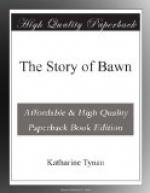Miss Bride was classical, like a Muse, with her dark silky hair just streaked with grey, looped away behind her ears; while Miss Henrietta, the younger, had ringlets and large eyes and a languishing air.
It was enough for them to hear that I was going to Dublin for there to be quite a commotion. The one little maid brought in the tea, which Miss Bride poured out of a china pot into little teacups which were all of different colours, although of the same design. The tea was fragrant and strong, with thick cream in it; and when I begged for a little water to be added the two sisters broke out in protestations. That would be a real slur on their hospitality, and, seeing how they took it to heart, I was obliged to set my own liking aside and drink the tea as it was.
There were slices of thin bread and butter and sandwiches and toast under a silver cover, all of which I could have eaten myself, for I had an excellent appetite. But I denied myself again, and was rewarded by hearing Miss Henrietta declare, on her second scrap of bread and butter, that she had a most indelicate appetite, and she hoped her dear young friend, meaning me, would not be shocked at her.
I could always spend an hour or two happily in the little low-browed cottage drawing-room, with even the strong May light coming in greenly, having been filtered through the new leaves. It was a room that always pleased my imagination, for it was so full of bits of china and pictures, of old silver and ivory curios and nicknacks, that you could spend a day looking at them. On the low walls were several portraits of pretty ladies, to whom the Misses Chenevix bore the strongest resemblance. Because there had been rain earlier in the day there was a fire in the grate and the firelight sparkled prettily on the glass of the pictures, on the china and silver, and in the brooches and rings of the ladies.
A half-glass door led from the drawing-room into an old-fashioned garden which was now nearing the last of its bloom, and presently would show a most wonderful profusion of fruit; giant strawberries, currants like strings of carbuncles and rubies, raspberries larger and juicier than mulberries, with a great quantity of apples and pears and plums and apricots to follow.
The sun had come out after the rain, and I could see from where I sat the garden sparkling; and the box borders smelt very sweet.
Both the ladies were eager to know what clothes I was to have and to learn what friends I was going to see and what festivities I should attend; and Miss Bride took care to impress upon me that my visit was to be paid at a hopelessly unfashionable time of year.
“There’ll be nothing doing at the Castle,” she said. “I wouldn’t be bothered going to Dublin unless I was to dine at the Castle.”
“I dare say Bawn will find plenty of other entertainment, sister, even though she does not visit at the Castle,” Miss Henrietta put in; she was always the conciliatory one. “There will be plenty of people in Dublin,” she went on, “who will be very glad to see Bawn—old friends of Lady St. Leger and of Mary Champion.”




